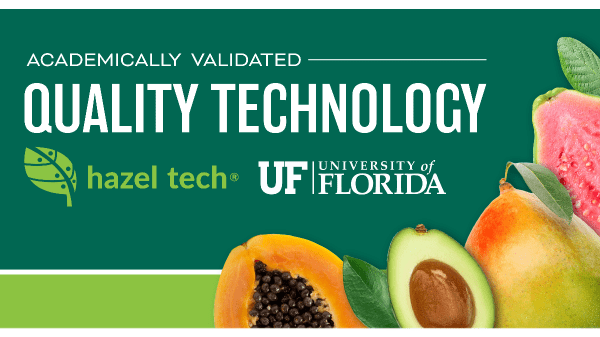University of Florida horticultural research team finds added shelf-life by utilizing Hazel 100, a new USDA-funded technology used with avocados, mangos, guava, and papayas, and other tropical fruits.
CHICAGO, IL (February 28, 2022) – The University of Florida Institute of Food and Agricultural Science (UF-IFAS) has found significantly positive results in their research testing the efficacy of Hazel’s flagship technology, Hazel 100, on commodities in the tropical category. Based on the team’s studies, Hazel 100 can extend the shelf life of tropical fruits including tropical avocados, papayas, mangos, and guavas from 4 days to 3 weeks.
The horticultural research team studying Hazel 100’s effect on tropicals is led by Dr. Jeffrey K Brecht and consists of Dr. Steven A. Sargent, Dr. Jonathan Crane, Graduate Research Assistant, Morgan Madison, and Biological Scientist, Moshe Doron.
The team utilized fruit harvested from the University of Florida’s Tropical Research and Education Center in Homestead, FL and transported it to the Postharvest Lab at UF in Gainesville. There they studied control and Hazel 100™ groups to see how the technology impacted fruit decay and shelf-life extension for the respective commodities.
The team found that Hazel 100 extended the shelf life of Maridol type papayas by 4 to 10 days, “Para” Florida-grown guavas by about 1 to 1.5 weeks, mangos by approximately 2 weeks, and tropical avocados by 2 to 3 weeks. They also found that Hazel 100 cut the decay in Maridol type papayas by 50% after 1 week of treatment.
“Once we understood Hazel 100 and its influence on different fruits as they ripen, we were able to determine how to simulate storage and shipping conditions for multiple tropical fruit and figured out how to maximize Hazel and its shelf-life extension capabilities,” commented Morgan Madison, Graduate Research Assistant at the University of Florida.
“We look forward to continuing our research with Hazel Technologies and seeing what other forms of food waste prevention they create in the future,” commented Madison.
“Export volumes of fresh tropical fruits have shown the fastest annual growth rate internationally in recent years,” commented Adam Preslar, CTO and co-founder at Hazel Technologies, “Through the research done at University of Florida we know that Hazel will have a huge impact on the export arrivals of these fruits and can help guarantee fresher produce for consumers across the globe.”
About Hazel Technologies: Hazel Technologies, Inc. is a USDA-funded startup company that develops new solutions to extend the quality shelf life of fresh produce and reduce food waste. Founded in 2015, Hazel Tech services over 250 of the world’s largest fresh produce packers, shippers, and retailers. Selected as a Finalist for Fast Company’s 2020 World Changing Ideas and winner of “Best Sustainable Packaging” at the 2020 World Food Innovation Awards, the company’s patent-pending technologies have been tested by top academic research programs.
For more information, visit www.hazeltechnologies.com.
About University of Florida, Horticultural Sciences Department: The Horticultural Sciences Department at the University of Florida is a team of faculty, staff, and students dedicated to improving fruit and vegetable production for the benefit of farmers and consumers. The department conducts cutting-edge research in plant breeding & genetics, plant and environmental physiology, fruit & vegetable production, postharvest physiology, biochemistry, and other disciplines.
For more information contact:
559-321-2146
media@hazeltechnologies.com



